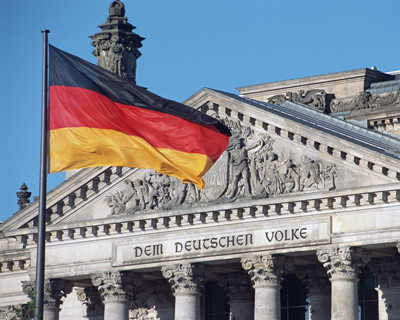德國企業
DAX max
DAX指數新高
A stockmarket milestone reflects optimism for German companies
股市里程碑折射出德國企業的樂觀心態
ECONOMIC growth of 2% this year, as is expected in Germany, is hot stuff only in the context of Europe's cool climes. But the DAX index of the country's biggest listed companies is truly sizzling, closing above 10,000 points for the first time on Monday June 9th, up by 22% on a year ago and nearly treble the low it hit in March 2009. The MDAX, an index of somewhat smaller companies, has performed even better. Share-traders' enthusiasm is shared by bosses: the Ifo business-climate index, a widely watched survey of companies, shows an optimism not seen since 2011.
德國今年的經濟增長達到了預期的2%,這成績只能在經濟低迷的歐洲稱得上醒目。不過該國最大的上市公司的DAX指數真可謂炙手可熱,在6月9日收盤首次突破10,000點,比去年同比增長22%,幾乎是2009年3月觸底點數的三倍。小型公司的指數MDAX表現更為突出。公司經理們也被股東們的熱情感染:本月,廣受關注的企業調查IFO商業景氣指數,顯示了2011年以來難得的樂觀情緒。

What justifies the cheer? Dirk Müller, a trader and commentator, although cautious about the heights share prices are reaching, thinks the prospects for Germany's carmakers are bright. Two of them, BMW and Volkswagen, have been among the top-five performers over the past five years, and the DAX's best performer has been Continental, a car-parts maker.
為什么如此樂觀?交易員兼評論員德克?穆勒雖然對目前的高股價持謹慎態度,還是認為汽車制造商的前景一片光明。其中的寶馬和大眾汽車兩家在過去的五年都一直是前五名,而在DAX指數中表現最好的是一家名為“大陸”的汽車零部件生產商。
In recent years the run-up in German automotive and engineering firms' shares has been driven by booming emerging-market sales. Now, China's market is cooling, and the prospects for sales in Russia have been dampened by its confrontation with the West over Ukraine. However, markets closer to home are coming to the rescue: car sales in Europe have increased for eight months in a row. Volkswagen, which sold 4.4% more cars in the first five months of 2014 than in the same period last year, says western Europe is now only second to the Asia-Pacific region in sales growth, a big change from recent years.
最近幾年,拜新興市場蓬勃發展的銷售所賜,德國汽車和工程公司的股票大幅增長。現在,中國市場正在降溫,而俄羅斯和西方在烏克蘭問題上的對抗使得該國的銷售前景黯淡無光。不過,窩邊草成了救命草:連續八個月,歐洲汽車銷售量節節攀升。大眾汽車在頭五個月的銷售量比去年同期增長了4.4%。它表示,西歐市場的銷售增長目前僅次于亞太地區,這同前幾年相比可是大大不同了。
Other German businesses may likewise see renewed vigour in domestic, European and rich-world markets, compensating for the weakening outlook elsewhere. Barclays, a bank, thinks that a long-overdue recovery in capital spending by companies in developed economies should help the country's many makers of industrial equipment and services. As examples, Barclays mentions Siemens, an engineering conglomerate, Infineon, a microchip-maker, and SAP, which makes business software.
其他的德國企業可能也同樣發覺了重新煥發活力的德國、歐洲和富裕國家市場,從而對于弱化的其他市場有所補償。巴克萊銀行認為,正如人們期待已久的,發達國家的資本支出開始回升給德國的工業設備制造商和服務提供商的發展提供了助力。巴克萊銀行提到的例子包括工程集團西門子,微芯片制造商英飛凌,還有商業軟件制造商SAP。
All three have struck cheerier notes in recent results announcements. Growth in company profits tends to lag GDP growth by a couple of quarters, so Siemens expects the strong first-quarter economic figure to translate into higher sales later this year. SAP sees the packaged-software market in its Europe, Middle East and Africa region growing by more than 5% this year. Infineon expects revenue growth of between 4% and 8% in the current quarter, and thinks rising demand from carmakers and other industrial customers will drive its growth this year.
以上三家公司都在最近的業績公告中有好消息。公司的利潤增長通常會落后于GDP增長幾個季度,因此西門子預計,第一季度的經濟數據勢頭強勁,將會在今年晚些時候轉化為銷售額的增長。SAP預計今年其套裝軟件在歐洲、中東及非洲地區的銷量增幅將超過5%。英飛凌預計本季度的收入增長將介于4%和8%之間,并且隨著汽車制造商和其他工業客戶的需求增長,它的增長也會被相應推動。
Although bosses are sounding increasingly happy about the prospects for their businesses, economists are wary. They think the hype on the stockmarket may be excessive. In particular, they worry that the decision on June 5th by the European Central Bank to push interest rates down into uncharted territory risks inflating a bubble—it was surely no coincidence that the DAX's record high came so soon after the ECB's decision.
盡管企業經營者們對于商業前景愈來愈歡欣鼓舞,經濟學家們卻憂心忡忡。他們認為目前股市的炒作可能過度了。他們特別擔心歐洲央行在6月5日決定將利率壓低到前所未有的程度,這將催生泡沫—之后,DAX指數很快創下歷史新高,這絕非巧合。
But the industrial bosses see a positive side to the ECB's move: cutting interest rates should tend to weaken the euro, making their exports outside the currency zone more competitive and boosting their value when translated back into euros. Adidas, a sportswear-maker, says that the strengthening euro knocked a 235m dent in its sales last year.
不過產業經營者們卻看到了歐洲央行舉動的積極一面:降息將削弱歐元,增加他們在歐元區外的出口競爭力,并在折算回歐元的時候提高他們的價值。阿迪達斯運動服的制造商表示,去年歐元升值導致銷售量下降了2.35億歐元。
Furthermore, with interest rates so low, German banks are falling over themselves to tempt customers with loans to buy new kitchens and take dream holidays, while loosening their loan criteria. Although retailers are not yet as cheerful as manufacturers, their spirits will be raised if the German Chambers of Commerce and Industry is correct in foreseeing a strong revival in domestic consumption. Dirk Schlotb?ller, an economist at the chambers of commerce, says geopolitical tensions and overgenerous government spending commitments should still give German businesses reasons for caution; but for now the chambers' member firms are telling him that things are looking up.
此外,德國銀行借低利率之機,千方百計的吸引客戶貸款購買新廚房、或者實現自己的夢想假期,同時還降低了貸款標準。雖然零售商沒有像制造商那么歡天喜地,但如果德國工商會對于國內消費將強勁復蘇的預言成真,那么這些零售商們也可以大舒一口氣了。一位商會的經濟學家德克·史洛博樂表示,地緣政治緊張以及過分慷慨的政府支出承諾,都是德國企業應當謹慎的原因。不過當前商會的成員公司都紛紛告訴他一切都在好轉。












